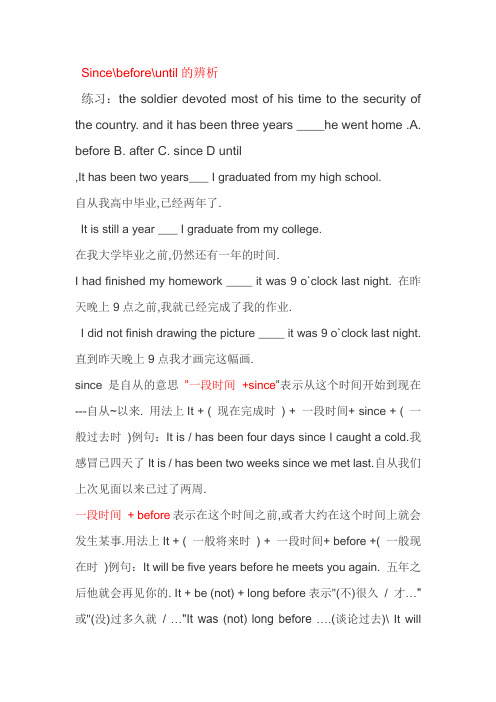浅析before和until的区别
in after later before ago earlier until 状语 区别

时间状语小结- 前前后后In【in + 时间段】介词,后接时间段,不能与时间点连用。
In用来表示从现在算起的“过一段时间以后”,常用在将来时的肯定句里,一般与go, come, start, arrive, return (be back), finish等表示瞬间动作动词连用,通常用于将来时或含有将来意义的句子。
They will arrive in half an hour. 半小时后他们将到达。
He will leave in a minute. 他一会儿就走。
After介词其后既可接时间点,又可接时间段。
【after+时间段】表示以过去时间为起点的一段时间以后,因此通常与过去时连用;He left there after two o'clock that afternoon.那天下午两点以后,他离开了那儿。
He started to go again after two days.两天以后,他又走了。
【after+时间点】如果用于一般将来时,那么其后应接时间点。
He'll come here after three o'clock.他3点钟后将来这儿。
He will arrive after five o’clock. 他5 点钟以后到。
【after+句子】连词,其后可接从句,连接2个句子。
I'll call you after I've spoken to them. 我和他们谈了以后就给你打电话。
After she had mixed flour with water, the children came home. 她用水和好面之后,孩子们回来了。
【after 单独使用】副词later in time; afterwards 表示以后And they all lived happily ever after . 从此以后他们都过着幸福的生活。
when,while,as,before,after,until的用法

when,while,as,before,after,until的用法when,while,as,before,after,until的用法在时间状语从句(Adverbial Clause Of Time)中所表示的动作与主句所标示的的动作关系的补充说明:a) 同时性(Same time)A:两个同时发生的事件,不是一次性和重复性,即过去或现在的习惯动作,连词用when,whenever eg:When he goes to town, he (always) visits his aunt. 一般现在时She(always)felt ill when she ate oyster.(牡蛎) 一般过去时当when 意为“每当。
的时候”,相当于whenever eg:Whenever he goes to town, he visits his aunt. ‖ When he goes to town, he visits his aunt. 同样,when /whenever 上述用法可以用if 交替使用,表“每次,每当。
” (关于这种if- 分局的条件句详见34讲)B. 两个同时发生的事件,如果都有延续性,而且延续时间大致相等,连词用when,while。
注:连词连接的两个分句中的动词,一定要为表示延续性动作的动词。
eg:The wind blew hard when the rain poured down.While I read, she sang. when, while前后分句都用一般过去时,有时也可前后都用过去进行体。
比较:I was cooking the dinner while he was playing thepiano = I cook the dinner while he played the piano 两句句意基本相同,只不过用过去进行体更加强调事件的持续性。
在一种特殊情况下,若要强调两个事件的延续的时间正好相等,可用as long as eg:He worked as long as we played. 他工作时我们在玩C. 两个同时发生的事件,如果都无延续性,连词用when,as soon as,just as(正当。
before与until的用法有哪些区别?

before与until的用法有哪些区别?
丛山
【期刊名称】《英语知识》
【年(卷),期】2008(000)004
【摘要】[问][476]before与until的用法有哪些区别?【答】before(在……之前)与until(直到……时)都可用作连接词引导时间状语从句。
它们在意义及用法上既有相似之处,也有一定区别。
【总页数】1页(P48)
【作者】丛山
【作者单位】沈阳市外国语学校,110005
【正文语种】中文
【中图分类】G633.2
【相关文献】
1.古代汉语使动用法与意动用法的区别 [J], 刘忠华
2.论古代汉语名词使动用法与意动用法的区别 [J], 刘忠华
3.古代汉语形容词使动用法与意动用法的区别问题 [J], 刘忠华
4.从《国语》看先秦否定副词“不”“弗”用法区别 [J], 曲美燕
5.动物、动物产品检疫的适用法律及官方兽医与动植物检疫机关检疫人员的区别[J], 黄汉新
因版权原因,仅展示原文概要,查看原文内容请购买。
in after later before ago earlier until 状语 区别

时间状语小结- 前前后后In【in + 时间段】介词,后接时间段,不能与时间点连用。
In用来表示从现在算起的“过一段时间以后”,常用在将来时的肯定句里,一般与go, come, start, arrive, return (be back), finish等表示瞬间动作动词连用,通常用于将来时或含有将来意义的句子。
They will arrive in half an hour. 半小时后他们将到达。
He will leave in a minute. 他一会儿就走。
After介词其后既可接时间点,又可接时间段。
【after+时间段】表示以过去时间为起点的一段时间以后,因此通常与过去时连用;He left there after two o'clock that afternoon.那天下午两点以后,他离开了那儿。
He started to go again after two days.两天以后,他又走了。
【after+时间点】如果用于一般将来时,那么其后应接时间点。
He'll come here after three o'clock.他3点钟后将来这儿。
He will arrive after five o’clock. 他5 点钟以后到。
【after+句子】连词,其后可接从句,连接2个句子。
I'll call you after I've spoken to them. 我和他们谈了以后就给你打电话。
After she had mixed flour with water, the children came home. 她用水和好面之后,孩子们回来了。
【after 单独使用】副词later in time; afterwards 表示以后And they all lived happily ever after . 从此以后他们都过着幸福的生活。
before与until的用法纠葛

before与until的用法纠葛▲答案应该选A。
句意:很抱歉让你一直等着玛西亚,可我恐怕她还要过十分钟才会来。
这是before从句的特殊句式。
在这种复合句中,主句包含表时间段的短语,且为肯定句常译成“……(后)才……”;主句包含表时间段的短语,且为否定句常译成“……就......”。
这样的句型通常使用三种时态:1. 一般将来时(a) It will be+时间段+before…do 还要过……才……It will be three years before his son returns from abroad. 要过三年他儿子才从国外回来。
(b) It will not be long before 过不了多久就会……It will not be long before he realizes his mistakes. 过不了多久,他就会意识到自己的错误。
2. 一般过去时(a) It was +时间段+before …did 过了……才……It was a week before I knew the truth. 过了一个星期,我才了解真相。
(b) It was not long before… 不久就……了;没过多久就……It was not long before he told me all about it. 没过多久他就把一切告诉我了。
3. 过去将来时(a) It would be +时间段+before… 还要过……才……It would be some time before the painkillers took effect. 止痛片得过些时候才会见效。
(b) It would not be long before…不多久就会……The expert predicted that it would not be long before robots replaced humans. 那位专家预言:要不了多久机器人会代替了人的。
初中英语语法 介词的用法辨析课件( by, before, until till)

I will be back before supper. 我将在晚饭前赶回来。
Please come before nine o’clock. 请在9点之前来。
Before eating the apple, I washed it carefully. 在吃苹果之前,我把它仔细洗过了。
before用作介词时,后可接 名词、代词宾格、动词-ing 形式。
before用作连词时,后面接 从句。
You had better wash your feet before you go to bed.
在你睡觉之前,最好洗脚。
until
③until/till用在肯定句中,意为“直到 ⋯⋯为止”,谓语动词为延续性动词;用 在否定句中,意为“直到⋯⋯才”,谓语 动词为非延续性动词。在非延续性动 词的否定式中,二者可通用,但位于 句首
has gone to Singapore. He will be back in a week.
我叔叔已到经去去了新年加坡年。他底将在,一周这之后家回来工。 厂已经生产了一 百多万辆小汽车。
②before意为“在⋯⋯之前”,指的是动作具体 发生的时间,而不Tips
是动作延续的时间,也不是动作最迟的时 间限制。
初中英语语法 常用介词的用法辨析(3)
①by含有“最晚不迟于⋯⋯,到⋯⋯为止”的意思。如果 by之后是将来的时间,则与将来时连用;如果是过 去的时间,则与过去完成时连用。
It's Lunch will be ready five ill come back in an hour(=at six o'clock). by 11:00.
非延续性动词
在非延续性动词的否定句中, till和 until可通用。
初中英语语法学习之状语从句精讲

初中英语语法学习之状语从句精讲英语状语从句是英语学习中的一个重要考点,下面将针对英语状语从句进行考点归纳。
一、时间状语从句时间状语从句是语法中的一个重要考点,下面是一些常见的时间状语从句:when:表示某个时间点或时间段,如“I will arrive at the airport when the plane takes off.”before:表示某个时间点或时间段之前,如“I will eat breakfast before I go to work.”after:表示某个时间点或时间段之后,如“I will finish my homework after I have dinner.”while:表示某个时间点或时间段持续,如“I was studying while she was sleeping.”as soon as:表示某个时间点或时间段一过去就发生,如“I will call you as soon as I get home.”until:表示某个时间点或时间段一直持续,如“I won't leave until I have finished my work.”since:表示某个时间点或时间段以来,如“I have been living in this city since I moved here last year.”when/while/as:这些词都可以引导时间状语从句,但它们的使用略有不同,需要根据具体语境选择使用哪个。
需要注意的是,如果主句是一般将来时,从句只能用一般现在时,如“I will go to the store tomorrow”中的“tomorrow”就是时间状语从句。
二、地点状语从句地点状语从句是语法中的一个重要考点,下面是一些常见的地点状语从句: where:表示某个地点,如“I will go to the store where I bought the groceries.”that:表示某个地点或位置,如“I saw a beautiful sunset over that mountain.”which:表示某个地点或位置,如“The building which is on fire needs to be evacuated immediately.”where/that/which:这些词都可以引导地点状语从句,但它们的使用略有不同,需要根据具体语境选择使用哪个。
since等的辨析

Since\before\until的辨析练习:the soldier devoted most of his time to the security of the country. and it has been three years ____he went home .A. before B. after C. since D until,It has been two years___ I graduated from my high school.自从我高中毕业,已经两年了.It is still a year ___ I graduate from my college.在我大学毕业之前,仍然还有一年的时间.I had finished my homework ____ it was 9 o`clock last night. 在昨天晚上9点之前,我就已经完成了我的作业.I did not finish drawing the picture ____ it was 9 o`clock last night. 直到昨天晚上9点我才画完这幅画.since是自从的意思”一段时间+since”表示从这个时间开始到现在---自从~以来. 用法上It + ( 现在完成时) + 一段时间+ since + ( 一般过去时)例句:It is / has been four days since I caught a cold.我感冒已四天了It is / has been two weeks since we met last.自从我们上次见面以来已过了两周.一段时间+ before表示在这个时间之前,或者大约在这个时间上就会发生某事.用法上It + ( 一般将来时) + 一段时间+ before +( 一般现在时)例句:It will be five years before he meets you again. 五年之后他就会再见你的. It + be (not) + long before表示"(不)很久/ 才…"或"(没)过多久就/ …"It was (not) long before ….(谈论过去)\ It will(not) be long before ….(谈论将来)\ It was long before she came back.\没过多久她就回来了.\ It will be long before we meet again.\x0d很久以后我们才会再见面.\ It will not be long before we turn our hope into reality. 过不了多久我们的希望就会变成现实. 这里it指时间, before是连词,引导时间状语从句.long可用一段时间来替代.Until1. 如果(主)句中的谓语动词是终止性动词即非延续性动词,应采用“...not ...until ...”结构,意为“……到……时候才……”.例如:You mustn’t eat anything until you see the doctor.看过医生之后,你才能吃东西.Don’t get off the bus until it has stopped. 车停稳了以后再下车.2. 用于肯定句中:1) It may last until Friday.这可能要延续到星期五.2) He will be working until 5 o'clock.他将一直工作到五点钟.3) She was a bank clerk until the war, when she trained as anurse.她战前是个银行职员,战时受训当了护士.不难看出until 用于肯定句中,表示句子的动作一直持续到until短语所表示的时间为止,即表示动作的终点.一般可译为“直到……时(为止)”或“在……以前”.在这种用法中,句子的谓语动词必须是持续动词(非瞬间动词),如live, wait ,last, love, like, stay, work, continue等.3. 如果谓语动词为否定式,则until应译为“到……时候才”,即“在……以前不”.例如:I did not watch TV until she came back.(= I began to watch TVwhen/after she came back.)直到她回来我才开始看电视.4. 连词until引导的从句中谓语动词的时态.1)主句的谓语动词为一般现在时或一般将来时时,until从句中的谓语动词为现在完成时,用来强调从句谓语动词表示的动作发生在主句谓语动词表示的动作之前.试比较:I won’t go to bed until I have finis hed my homework.我要完成作业才睡觉.2)主句中的谓语动词为一般过去时时,从句中的谓语动词为过去完成时,用来强调从句谓语动词的动作发生在主句谓语动词表示的动作之前.试比较:Li Lei didn’t come until the film had begun.直到电影开演,李雷才来.〔特别提醒〕till和until的意思基本相同,用法也基本一样,但until 语气较重,多用于较正式的文体里.till多用于英式英语,until多用于美式英语;till不能用在句首,也不能用在not开头的短语或从句里,而until可以.例如:Until he came home, we knew the news.在他到家之前,我们不知道这消息.Not until nine o’clock yesterday evening did we finish the work. until和before用法的区别一、在下列情况下,两者可互换用,但含义略有不同.before表示“在……之前”的意思,强调时间先后关系;而until表示“直到……才”的意思,主句是肯定句则表示主句动作的终止时间;主句是否定句则强调主句动作的起始时间.1.主句为否定式终止性谓语动词.常见的动词是open, start, leave, arrive, finish, stop等.例如:(1)The noise of the street didn't stop until/before it was midnight.(2)The children won't come back until/before it is dark.(3)I didn't leave the lovely boy until/before his mother came home.2.主句为肯定式、延续性谓语词,这类动词用stand, stay, talk ,be, wait 等.例如:(1)He lived with his parents until/before he graduated from school.(2)I will wait until/before he comes to my help.(3)I shall stay here until/before you come back.二、在下列情况下,用before不用until.1.主句这肯定式、终止性谓语动词,只用before.“在…之前就”、“没来的及就”(1)He fell asleep before I could take off his clothes.(2)We arrived there before it started to rain.(3)The holiday came to the end before I knew it.(4)He almost knocked me down before he saw me.2.主句谓语动词强调动词的迟缓性,只用before,常伴有时间段状语或时间段暗示.例:(1)It was quite some time before he found the elephant at all.(2)We had walked a long way before we found some water.(3)We had sailed for two days before we saw the land.(4)The fire lasted about four hours before the firefighters could control it.(5)It was midnight before my brother came home.(6)It was three months before they met again.3.如果强调从句谓语动作未发生,就发生主句谓语动作,只用before.常译为“未及”,“不”或“不等……就”.例:(1)We can leave early in the morning before it gets too hot.(2)I must write it down before I forget it.(3)We do want to buy something now before prices go up.4.在某些特定句型中用before.例如:(1)It was not long before the whole country rose up.(2)It will probably not be long before they understand each other.三、下列情况一般区别用until.1.主句是持续性谓语动词时,肯定、否定都可以,但意义完全不同.肯定表动作终止,而否定表动作开始.例如:(1)We discussed the problem until/before he came back.我们一直讨论到他回来.(2)We didn't discuss the problem until he came back.我们一直等到他回来后才讨论问题.2.not…until句型尽管在某些情况下可与before互换用,但在强调句中一般仍用until.例如:(1)It was not until he told me that I knew it.(2)It was not until he finished his homework that he went home.。
- 1、下载文档前请自行甄别文档内容的完整性,平台不提供额外的编辑、内容补充、找答案等附加服务。
- 2、"仅部分预览"的文档,不可在线预览部分如存在完整性等问题,可反馈申请退款(可完整预览的文档不适用该条件!)。
- 3、如文档侵犯您的权益,请联系客服反馈,我们会尽快为您处理(人工客服工作时间:9:00-18:30)。
浅析before和until的区别
在日常的英语学习中,我们遇到before和until时,往往会将二者搞错。
其实,只要我们能把握住两者在使用时本身的含义及主句动词是终止性的还是延续性的,是肯定式还是否定式两大特点,就能很容易地解决这类问题。
一、在下列情况下,两者可互换用,但含义略有不同。
before表示“在……之前”的意思,强调时间先后关系;而until表示“直到……才”的意思,主句是肯定句则表示主句动作的终止时间;主句是否定句则强调主句动作的起始时间。
1.主句为否定式终止性谓语动词。
常见的动词是open, start, leave, arrive, finish, stop等。
例如:
(1)The noise of the street didn’t stop until/before it was midnight.
(2)The children won’t come back until/before it is dark.
(3)I didn’t leave the lovely boy until/before his mother came home.
2.主句为肯定式、延续性谓语词,这类动词用stand, stay, talk, be, wait等。
例如:
(1)He lived with his parents until/before he graduated from school.
(2)I will wait until/before he comes to my help.
(3)I shall stay here until/before you come back.
二、下列情况下宜用before不用until.
1.主句为肯定式,谓语为瞬间动词时只用before. (想一想为什么)1) He fell asleep before I could take off his clothes.
2) We arrived there before it started to rain.
3) The holiday came to an end before I knew it.
4) He almost knocked me down before he saw me.
2.主句谓语动词强调动作的迟缓性,只用before,这时常伴有时间段状语或时间段暗示。
It was quite a long time before he found the elephant.过了很长时间,他才找到大象。
We had walked a long way before we found some water.走了很长的路我们才找到水。
We had sailed for two days before we saw the land.航行了两天我们才发现陆地。
It was midnight before my brother came home.我哥哥直到半夜才回来。
3.如果强调从句谓语动作未发生就发生主句谓语动作,只用before,这时常译为“未及(不等)……就……”
1)We can leave early in the morning before it gets too hot.趁天还不太热,我们上午早点离开。
2)I must write it down before I forget it.趁我还未忘,我必须把它记下来。
4.表示“与其说……倒不如……”,“与其……毋宁……”的意思时只用before.
I would give up my job before I agree to be dismissed. 我与其被解雇还不如先辞职。
He will die of hunger before he steals.他宁愿饿死也不愿意去偷。
5.在某些特定句型中用before。
It was (not) long before…(不久)过了很长时间才…
It will (not) be long before…(不到)要过很长时间才会… For example:
It will probably not be long before they understand each other. 他们大概过不久就会互相了解。
It was not long before the whole country rose up. 不久全国人民奋起反抗。
long before很早以前
三、下列情况一般使用until
1.主句是持续性谓语动词时,肯定,否定都可以,但意义完全不同,肯定表示动作终止,而否定表示动作开始。
For example:
1)We discussed the problem until/before he came back. 我们一直讨论到他回来。
2)We didn’t discuss the problem until he came back. 我们一直等他回来才讨论问题。
(持续动词之否定)
2.Not…until…句型尽管在某些情况下可与before互换使用,但在强调句中一般仍用until;
1). It was not until he told me that I knew it.直到他告诉我我才知道这件事。
2)It was not until he finished his homework that he went home.直到完成作业他才回家。
3.放于句首时用until.
Until he finished his homework he didn’t go home. 直到完成作业他才回家。
应注意:在使用not until时,若not until放于句首,句子应部分倒装。
Not until he finished his homework did he go home. 直到完成作业他才回家。
四、其他技巧
1.before只是陈述以前的事实,用until则着重后来的变化情况:
This book was so interesting that he read it for three hours until he realized it.
2.until引出的分句内容是真实的,而before引出的分句的内容可能是真实的,也可以是非真实的:Let’s wait until the rain stops.
Pig will fly before he’ll become a mathematician.。
